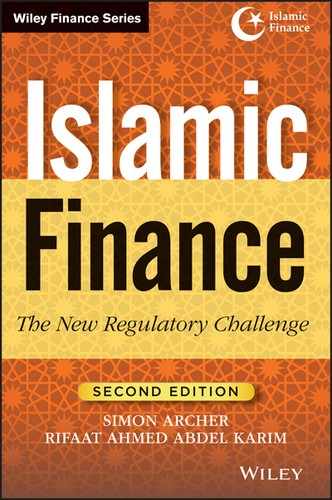Foreword
Islamic finance has continued to be the fastest growing sector of the international financial system. This growth has also been in quality and depth, resulting from a high degree of innovation that has kept pace with the new demands for financial products and services as economies continue to evolve and transform. Of significance is the greater abundance of profit-sharing and loss-bearing savings and investment products and other instruments that use structured finance. Given these developments, Islamic finance has demonstrated its potential to provide effective financial intermediation to meet the needs of a modern globalised financial system and economy.
While Islamic finance has shown its resilience and sustainability during this recent global financial crisis, the significant and rapid evolution of Islamic finance highlights the need for greater focus and attention on issues of prudential regulation, risk management, and overall financial stability. The evolving compendium of standards, codes, and principles from the Basel Committee on Banking Supervision, the Financial Stability Board, and other international standard-setting bodies has brought greater clarity and understanding to issues on the regulation and supervision of banks and financial institutions, including Islamic financial institutions.
However, given the uniqueness of Shari’ah-compliant modes of fund mobilisation, funding, and financing, the different financial stability and regulatory challenges may not be fully addressed by the global standards that have been issued. The Islamic Financial Services Board (IFSB) has addressed this in developing and contextualising the prudential, regulatory, and supervisory standards for Islamic finance. In addition, the work of the IFSB addresses the risk of Shari’ah–non-compliance and fiduciary risk, which are specific to Islamic finance, and complements the work of other international standard-setting organisations by bringing a valuable perspective to current and emerging issues.
The international standards are now being voluntarily observed in most nations of the world in efforts to build more resilient financial systems. The effective implementation of these international standards at a national level requires enabling banking and financial legislation that is responsive to market developments, and empowers authorities within a clear accountability framework to act pre-emptively in addressing risks to financial stability. In Malaysia, the recent passage of the Islamic Financial Services Act will substantially strengthen the capacity of the regulatory authority to meet the challenges of the Islamic financial system.
The first edition of Islamic Finance: The Regulatory Challenge by Professors Simon Archer and Rifaat Ahmed Abdel Karim was an important addition to the literature on the regulation of Islamic finance. This second edition addresses the implications of the recent global financial crisis on the regulation of Islamic financial services. The book has dealt with the relevant regulatory issues in a timely manner and would be much welcomed by both practitioners and academics.
Dr. Zeti Akhtar Aziz,
Governor
Bank Negara Malaysia
